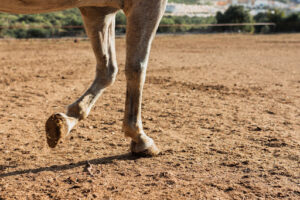5 Subtle Signs Your Horse May Be Struggling With Digestion
As horse owners, we often focus on the obvious signs of illness—limping, coughing, or visible wounds. However, when it comes to equine digestive health, the most important warning signals are often the subtle ones that can easily slip under our radar. That’s why understanding these early indicators and knowing how to support your horse’s digestive […]

As horse owners, we often focus on the obvious signs of illness—limping, coughing, or visible wounds. However, when it comes to equine digestive health, the most important warning signals are often the subtle ones that can easily slip under our radar.
That’s why understanding these early indicators and knowing how to support your horse’s digestive system during weather transitions can make the difference between a minor issue and a serious colic episode. Let’s dive into the article to know more.
The Importance Of Equine Digestive Health During Seasonal Changes
Horses have incredibly sensitive digestive systems that can be significantly affected by changing weather patterns. From fluctuating temperatures to changes in forage quality, these seasonal shifts require careful attention to maintain optimal horse gut health in the winter months.
The equine digestive system relies heavily on consistent routines, stable forage quality, and adequate hydration. When any of these elements change—which naturally happens with the seasons—your horse’s digestive balance can become compromised. This can lead to various horse digestion problems that may start subtly but can escalate quickly if not addressed.
5 Subtle Signs Your Horse May Be Struggling With Digestion
1. Behavioral Changes and Mood Shifts
One of the earliest indicators of digestive discomfort is often behavioral. Your typically calm horse might become unusually irritable during grooming or seem reluctant to work. These mood changes aren’t just attitude problems—they’re your horse’s way of communicating internal discomfort.
You might notice increased sensitivity around the girth area or unusual reactions to routine activities. Some horses become more anxious during feeding time, while others might seem duller or less enthusiastic about activities they normally enjoy.
These behavioral shifts often appear days or even weeks before more obvious symptoms develop, making them crucial early warning signs for horse digestion problems.
2. Girthiness and Flank Sensitivity
When your horse suddenly becomes difficult to saddle or shows sensitivity when you touch their flanks, this could indicate underlying abdominal discomfort. Ear pinning, tail swishing, or stepping away when you apply gentle pressure to their sides are all signs that shouldn’t be ignored.
This sensitivity often stems from gas buildup or mild cramping in the digestive tract. While it might seem like a training issue, it’s frequently related to digestive discomfort that requires attention to improve horse digestion rather than more disciplinary measures.
3. Changes in Manure Quality
Your horse’s droppings are like a daily health report card. During seasonal transitions, you might notice softer, looser stools or conversely, harder, drier manure. These changes in consistency, color, or frequency can indicate that your horse’s digestive system is struggling to process their current diet effectively.
Inconsistent manure quality is often one of the first signs that seasonal horse digestion care is needed. The digestive system may be responding to changes in forage quality, water intake, or stress levels associated with weather changes.
4. Reduced Appetite or Subtle Weight Changes
A horse that suddenly becomes less interested in their feed or shows slight weight loss may be experiencing digestive discomfort. Unlike dramatic appetite loss, these changes are often gradual and can be easily attributed to other factors like weather or routine changes.
Pay attention to horses that take longer to finish their meals, leave feed behind, or seem less enthusiastic about treats. These subtle appetite changes can indicate underlying issues like gastric ulcers or disrupted gut bacteria.
5. Decreased Energy and Performance Issues
Lethargy, reluctance to move forward under saddle, or a general lack of enthusiasm for work can all signal digestive problems. When the gut isn’t functioning optimally, horses may experience discomfort that affects their overall energy levels and willingness to perform.
This decreased performance often coincides with cooler, damper weather when horses naturally drink less water and may experience slower gut motility.
Recognizing this connection between weather changes and digestive function is essential for maintaining optimal equine digestive health.
Also Read: Tips to Help Your Horse Cool Down After Exercise
5 Essential Horse Digestion Tips for Changing Weather
1. Maintaining Consistent Hydration
Water intake becomes crucial during weather transitions. Cold temperatures naturally reduce a horse’s desire to drink, which can lead to dehydration and increased risk of impaction colic. Providing lukewarm water and ensuring constant access to clean water sources can significantly improve your horse’s digestive function.
Consider adding electrolytes to encourage drinking or providing warm water during particularly cold periods. Proper hydration is fundamental to maintaining horse gut health in winter and preventing many common digestive issues.
2. Gradual Dietary Transitions
One of the most important horse digestion tips is to make any feed changes gradually over seven to ten days. As grass quality changes in autumn or when transitioning from pasture to hay, sudden dietary shifts can disrupt the delicate balance of gut bacteria.
This gradual approach allows the microbiome in your horse’s hindgut to adapt to new feed types without causing digestive upset. Whether you’re introducing new hay, changing concentrate feeds, or adjusting supplement routines, slow transitions are key to preventing horse digestion problems.
3. Managing Pasture Sugar Levels
Autumn pastures can contain elevated sugar levels, particularly fructans, which can cause digestive distress in sensitive horses. These high-sugar periods increase the risk of laminitis and can disrupt normal digestive processes.
Consider limiting turnout during times when grass sugar content is highest, typically during cool, sunny days. Testing your pasture for sugar content or turning horses out during early morning hours when sugar levels are lower can help maintain optimal digestive health.
4. Supporting the Microbiome with Targeted Supplementation
The use of horse digestive supplements becomes particularly important during seasonal transitions. Probiotic and prebiotic supplements can help maintain healthy gut bacteria populations during times of dietary or environmental stress.
Quality horse digestion supplements that include digestive enzymes, gastric buffers, and beneficial bacteria can provide additional support when your horse’s natural digestive processes are challenged by weather changes. These supplements work best when used proactively rather than reactively.
5. Monitoring and Preventing Impaction Risks
Colder, wetter conditions combined with increased hay consumption can slow gut motility and increase impaction risk. Ensuring adequate daily movement and considering easily digestible fiber sources like soaked hay cubes can help maintain healthy gut function.
Regular exercise, even during winter months, stimulates natural gut motility and helps prevent the sluggish digestion that can occur when horses spend more time confined to stalls.
Also Read: Horse Leg Protection Guide: Types of Horse Boots and Leg Wraps
Conclusion
Recognizing the subtle signs of digestive struggle and implementing appropriate seasonal care strategies can keep your horse comfortable and healthy throughout weather transitions.
Working closely with your veterinarian to develop a customized plan that addresses your horse’s specific needs can help prevent minor digestive issues from developing into serious problems. This might include adjusting feeding schedules, incorporating specific horse digestive supplements, or modifying turnout routines based on weather conditions.







